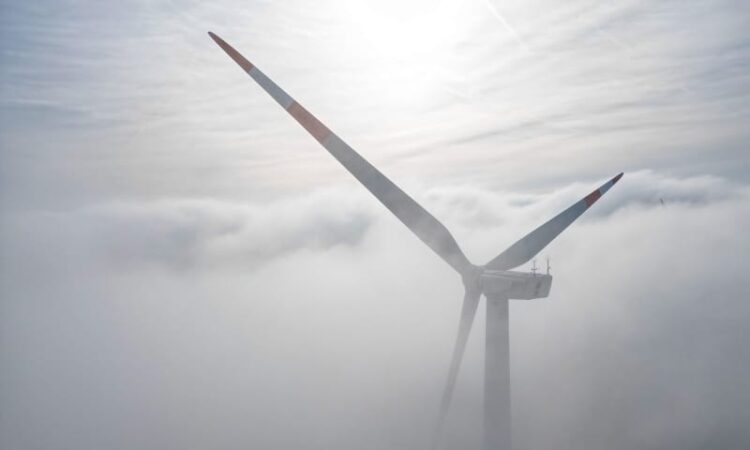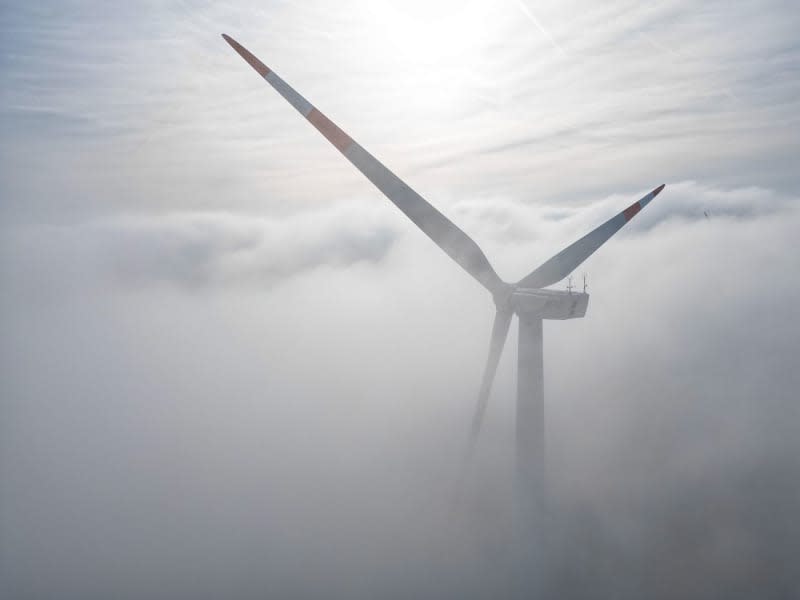

The European Commission announced investigations last week into Chinese suppliers of wind turbines in Spain, Greece, France, Romania and Bulgaria.
It’s the latest move by Brussels targeting suspected Chinese green tech subsidies that could undermine fair competition – from the solar panel industry to a closely watched probe into e-cars.
The European Union’s competition chief, Margrethe Vestager, announced the inquiry during a speech at the Institute for Advanced Study in Princeton, New Jersey in the United States.
“China is for us simultaneously a partner in fighting climate change, an economic competitor, a systemic rival. And the last two dimensions are increasingly converging,” Vestager said in her speech.
According to industry lobby group WindEurope, Chinese wind turbines are marketed in Europe for as little as half the price of European-made turbines.
Brussels wants a major increase in renewable energy to achieve net-zero greenhouse gas emissions by 2050. But the EU is also concerned about over-reliance on cheaper Chinese technology.
In Spain, for example, the China Three Gorges Group is bidding for two major renewable energy projects, which together represent around 1,500 megawatts (MW). In both bids, the group is competing with some of the big names in European electricity, such as Naturgy, Engie and Verbund.
On Friday, Chinese Commerce Minister Wang Wentao accused the commission of pursuing “protectionist” actions at the expense of green initiatives by launching investigations into suspected Chinese subsidies.
“We can’t understand how the European Commission on the one hand carries the flag for green sustainable development and on the other hand undertakes protectionist operations,” Wang said at an Italy-China economic forum in Verona.
Vestager’s latest announcement came just days ahead of a high-profile trip to Beijing by German Chancellor Olaf Scholz, accompanied by a senior business delegation.
During the visit, Chinese President Xi Jinping told Scholz on Tuesday that, given their reliance on industry and free trade, Germany and China should both “guard against the rise of protectionism.”
FRENCH FINANCE MINISTER: EUROPE NEEDS AN ECONOMIC STRATEGY
Fearful of the impact on their own economies, the EU and the US are keeping a close eye on the extent to which Beijing is providing subsidies.
“Our economies cannot absorb this. It is not only dangerous for our competitiveness. It also jeopardizes our economic security,” Vestager said. “We have seen how one-sided dependencies can be used against us. And this is why Europe, and not only the US, is reacting.”
The EU’s probe into wind parks comes on the heels of recent criticism from the US over China’s excess industrial capacity. US Treasury Secretary Janet Yellen said that Washington “will not accept” underpriced Chinese goods flooding the global market.
The US is concerned that subsidization by Beijing is leading to more production than global markets can take in, resulting in a surge of cheap exports in sectors such as solar energy and electric vehicles, stifling the growth of those industries elsewhere.
Last week, the finance ministers of Germany, France and Italy – the three largest eurozone economies – met near Paris for the third trilateral meeting on Europe’s economic power and challenges to economic security – including from China.
“Europe must reconnect with economic power, with risk and with innovation, and with the prosperity of our fellow citizens,” French Finance Minister Bruno Le Maire said. He said China and the US “will not give Europe any gifts,” and accused both Beijing and Washington of protectionism. “There is not a second to lose” in developing an EU economic strategy, Le Maire said.
ELECTRIC TRAINS IN BULGARIA, SOLAR PANELS IN ROMANIA
The investigation into wind turbines follows earlier EU probes into Chinese subsidies for solar panels, electric cars and trains. It was launched under the new Foreign Subsidies Regulation, designed to prevent foreign subsidies from undermining fair competition within the EU.
The commission opened its first probe under the new law in February, targeting a subsidiary of Chinese rail giant CRRC, which bid for a tender in Bulgaria to supply electric trains. That investigation was closed after the subsidiary withdrew its bid.
A second probe targets Chinese-owned solar panel manufacturers seeking to build and operate a photovoltaic park in Romania, partly financed by the EU. The Chinese companies “may unduly have been advantaged,” Vestager said in her Princeton speech.
Under the regulation, a company is required to notify the commission when it bids for public tenders in the EU worth over €250 million ($266 million), and when the company has been received financial contributions of at least €4 million from a non-EU country in the last three years.
INDUSTRY FEARS ELECTRIC VEHICLE TRADE WAR
“In October last year, the European Commission launched an anti-subsidy investigation into the import of electrical vehicles from China. If we determine that those electrical cars have been illegally subsidised, we will impose remedies,” Vestager said.
According to the commission, Chinese electric cars are normally around 20% cheaper than models built in the EU. The anti-subsidy investigation could lead to the EU imposing punitive tariffs.
Last week, German car manufacturers said they oppose new tariffs on electric cars from China because it could start a trade war. The German Association of the Automotive Industry (VDA) called for dialogue to avoid harming the sector’s development.
“Anti-subsidy measures, such as additional tariffs, would not solve the challenges for the European and German automotive industry.” VDA president Hildegard Müller told the German newspaper Welt am Sonntag. Punitive tarrifs “could quickly have a negative impact in the event of a trade conflict,” she warned.
According to the Center for Automotive Research, an independent international research group, German car manufacturers sell 30% to 40% of their output on the Chinese market. In the event of a trade war, these manufacturers could be the first target of Chinese retaliation.
The commission is planning to make a preliminary announcement by June 5, Welt am Sonntag reported.
The content of this article is based on reporting by AFP, Agerpres, ANSA, dpa, EFE and PAP as part of the European Newsroom (enr) project.






